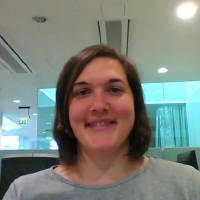The Ximbassador Programme is a paid part-time internship, focusing on sourcing and commercialising life science reagents that have been created on campus. It provides PhD students, Post-Docs and Laboratory Research Technicians with valuable hands-on experience and the skills needed to start a career within the technology transfer industry. We spoke to Dana, our Ximbassador at the Beatson Institute to discover her experiences:

Why did you decide to apply for the internship?
“I’ve been quite interested in the technology transfer industry for a while and started actively looking at how I could gain experience of this industry around my Post-Doc role. The Translational Executive at the Cancer Research UK Beatson Institute was at a meeting in London and found out about the internship. She then told me about it. So, I found out about this Internship quite serendipitously. The role sounded perfect as I could do it around my day job and it was much more hands-on than anything I could do online - Online exams are useful, but when you attend an interview, people don’t care about the exams – they want tangible experience and I felt this internship would provide that for me.”

What were your expectations from the role?
“I imagined that the role would be a lot easier than I found it to be. I assumed scientists and academics would be really positive about commercialising their reagents and in the main they were, but there were a few exceptions. Some of the researchers believed everything created through scientific research should be given away for free and so I had to change the way I would talk to scientists and the way I would present the benefits of reagent commercialisation to respond to these arguments. I found this ethos particularly difficult to respond to, as academics nowadays need to collaborate much closer with industry.”

What did you do during your internship?
“The Technology Transfer Office (TTO) I worked with was responsible for two institutes – the Beatson Institute and the Wolfson Wohl Cancer Research Centre. Working with the PIs at the Beatson involved a lot of face-to-face meetings and reminders. After talking to every Principal Investigator (PI) at the Beatson, introducing the concept of reagent commercialisation and discovering what if any reagents they had for commercialisation, I decided to talk to PIs at Wolfson Wohl. This was difficult as Wolfson Wohl is connected to Glasgow university and Ximbio, at that time, didn’t have an agreement with Glasgow. I worked with Ximbio on the process of setting up an agreement with Glasgow university. This was really useful as it provided me with an insight into the different administrative needs that have to be addressed when creating an agreement, that I wasn’t previously aware of.”

What was your best achievement?
“I was most proud of the way I managed to spread awareness of the importance of commercialisation and the role of the TTO and Ximbio across the institutes. I think my willingness to take the initiative and talk to more researchers, post-docs etc. really helped establish the Ximbassador Programme and created an expectation of the service and that it exists. I helped ensure that the commercialisation of reagents becomes a standard service that everyone is ready to use it, rather than it being a one-off internship/ service.”

What did you find the most challenging part of the role?
“The thing I found the most challenging, was trying to convince researchers, who had a totally different ethos to me, why commercialising reagents was a really good idea. These researchers often entered the industry at a time where all scientific research was readily available and anything that anyone created was free. These instances though were rare as most people I spoke to understood and were positive about the benefits of commercialising reagents.”

What insights or skills did you gain from the internship?
“I gained a greater understanding of how technology transfer works e.g. who is involved, who you have to talk to, what goes on in the background, how agreements are put together and the things you need to know when putting the agreement together. I had a lot of different cases which was useful, where some projects had been funded from different institutes, so I got a complete understanding of the complexity involved in tech transfer.
I also learnt how to talk to people, as you can’t rely on them knowing you to establish relationships. Knowing how to professionally approach a meeting and how to tailor your messages to the PI was a key skill I learnt on the internship. Being able to present the benefits in a way that would appeal to the researcher was crucial.”

What advice would you give to any new Ximbassador?
“I would say be patient. I started the internship very over enthusiastically, but things take time. Commercialisation for a researcher isn’t a high priority and they are often very busy and don’t always see the benefit. I would also say don’t give up - if people don’t respond for months, you just have to be persistent and hands-on.
I would also say to be aware of the different benefits this internship can give you, if you work for it, not only to you personally, but also to your institute. Helping researchers commercialise their technology ensures that you are helping preserve the reagent for other researchers. A lot of money and effort is lost when reagents are simply thrown away. It is particularly vital to commercialise mouse lines, as no one knows what was created years ago, that could be useful in your experiments.”

How do you think the Ximbassador internship will influence your future career?
“The Ximbassador Programme gave me the ability to network and get in touch with people within the TTO at CRUK and allowed me to establish a better relationship with the translational executive at the Beatson. It also helped me to develop relationships with other individuals working in tech transfer and to build up the confidence to ask for advice and new experiences. Due to the internship I was able to show my ambition to work in a TTO and as a direct result of the skills I have learnt on this internship, I applied for and was offered the role of a translational manager at Cancer Research UK.”

